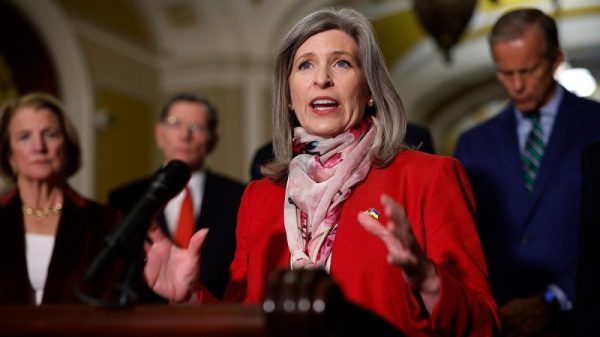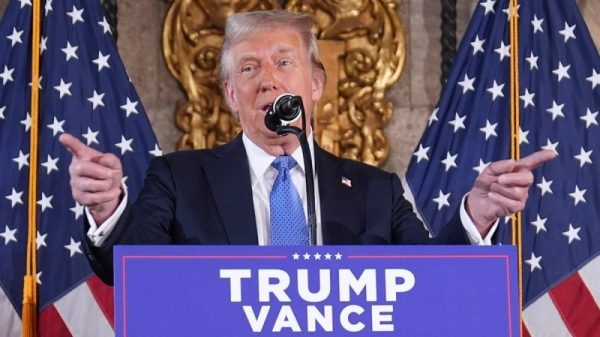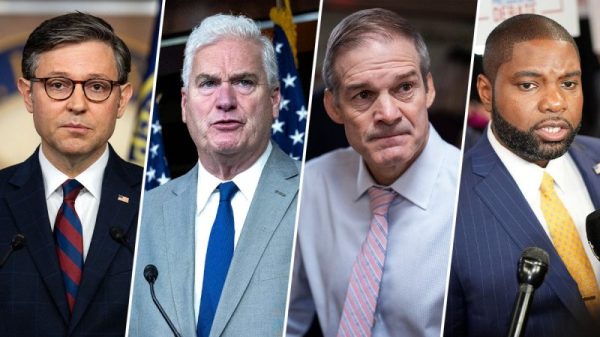There are no second acts in American public life – but there are reruns. So, this year, like it or not, American voters appear to face a November choice between former President Donald Trump and current President Joe Biden.
More than just allowing debate moderators to address each opponent as ‘Mr. President,’ this would be the first election in over 100 years in which both major parties nominated candidates who had actual experience in the job. That is likely to dramatically affect the way each conducts their campaign.
In 1892, former President Grover Cleveland (D) ran against Benjamin Harrison (R) who had defeated him in the election of 1888.
In 1888, even though Cleveland had successfully appointed a large number of judges to the courts, he was hampered by his unpopular effort to reduce tariffs designed to protect U.S. manufacturing. Despite winning the popular vote, the tariff issue caused him to lose several important manufacturing states–including Illinois (by 3 points), Indiana (by less than 1 point), New York (by 1 point), and Ohio (by 2 points)–and cost him the vote in the Electoral College.
In 1892, however, the tariff issue worked against Harrison as voters tired of paying more for imported goods and he was seen as being too supportive of big business. His heavy-handed response to labor strikes was especially damaging with working-class voters.
Yes, in American politics, the names and the dates change, but the issues remain.
Typically, when an incumbent is running for reelection, voters get to choose ‘the devil they know’ or the ‘devil they don’t know.’ Insiders call them ‘referendum elections,’ in which the record of the incumbent is the main basis for voters’ decisions. The challenger matters, of course, but the main hurdle is presenting oneself as a plausible alternative should voters decide to ‘fire’ the incumbent.
The last election, 2020, was a classic ‘referendum’ election. The incumbent (Donald Trump) was running – in the midst of the COVID pandemic – against a plain-vanilla former senator and vice president. It was an election that the incumbent (despite all the baggage acquired before and during the pandemic) came very close to winning.
Fast-forward four years – and we have two actual incumbents, with track records that the vast majority of likely voters have observed in real time.
Views of the first incumbent (Trump) are firmly held. While Democrats want voters to remember the economic trough brought on by COVID, almost all Republicans have favorable memories of the Trump era. A recent YouGov/CBS News poll asked Trump supporters (representing roughly half of the 2024 electorate) why they were supporting him. Fully 97% of Trump supporters said ‘things were just better under Trump.’ In other words, essentially all Trump supporters view his presidency as just plain better.
One can reasonably argue that the last year of the Trump administration – with the pandemic resulting in lockdowns, historic job losses, a recession, enormous government spending to prop up the economy, combined with his refusal to accept the results of the election and his second impeachment – cast a shadow over Trump’s entire four-year term.
But that’s not how Trump supporters view his term. If one just looks at the three years from January 2017 through February 2020, the economy was growing, interest rates were low, inflation was essentially non-existent, and our involvement in overseas wars appeared to be ending. Indeed, the Trump supporters’ view of his presidency seems to take February 2020, just before public notice of the COVID-19 virus, as its endpoint.
The second 2024 ‘incumbent,’ Joe Biden, has not been as fortunate. A year ago, we posited that Biden’s reelection efforts depended less on his (lackluster) polling than on how things would turn out in four hot issue areas – the economy, efforts to counter the global impact of China, the war in Ukraine, and the Middle East. Biden’s fingerprints are all over each of them, and the public will judge the incumbent Biden based on how they look in the fall, just before the election.
The difficulty for Biden is that all four areas remain challenging both in reality as well as in public perception.
Yes, inflation is down from the 2021 highs, but prices at the grocery store and the gas pump remain higher than they were when Trump was in office. Yes, Biden coaxed the Congress to help U.S. companies invest in high-tech chips, but China still seems to be making inroads in the global economy and continues to appear to be a threat to Taiwan. Yes, the efforts of the U.S. have helped Ukraine defend itself against Russian aggression, but the war still appears to be at a stalemate. Yes, the Israel-Hamas war may be waning, but Iranian- backed Houti rebels and others remain a threat to U.S. interests and show no signs of backing down in the face of American attacks.
Significantly, three of the four ‘open questions’ are foreign policy-based. And while it’s true that foreign policy rarely is decisive in American politics, actions on the foreign stage are highly dramatic and give US presidents an opportunity to demonstrate their skills … or failings. Jimmy Carter failed to secure the release of U.S. hostages in Iran. Conversely, Ronald Reagan effectively confronted the Soviet Union with his challenge to Mikhail Gorbachev to ‘tear down this wall.’
Recent presidents have managed small wins that nevertheless helped build the case for their seriousness and expertise. Barack Obama helped negotiate the Iranian nuclear deal and led the effort to kill Usama bin Laden, while Donald Trump opened a dialogue with North Korean dictator Kim Jung Un and helped broker a series of bilateral agreements between Gulf States and Israel.
Bottom line: While the verdict on the Trump incumbency is settled – with a large chunk of Americans concluding that ‘things were pretty good’ – Biden’s record remains incomplete. We don’t know how voters will view his economy, his efforts in the Mideast, whether Ukraine-Russia will remain a stalemate, and the extent to which China will remain a clear threat ten months from now.
But that’s the campaign we’ll be seeing: A race between two incumbents (all caveats about the actuary perils of assuming that Biden and Trump will be the major party candidates notwithstanding). And, in the highly polarized America of 2024, their focus needs to be less on campaigning against the other as highlighting and defending their own records. Their strategic focus needs to be reminding their respective partisan bases of the efficacy of their presidencies.
Trump’s current edge in the polls is based on the fact that his partisans have already concluded that ‘things were better’ under Trump. But Biden has an opportunity because his incumbency remains ongoing and he can use his presidency to make the case to skeptical supporters that he has done a good job.
But the ‘known unknowns’ remain. Maybe they improve for Biden, and maybe they do not. If they improve, Biden could be one of the least expected two-term presidencies of all time. Or they could turn south and he can become this century’s Benjamin Harrison.
Daron Shaw is a member of the Fox News Decision Team.


































